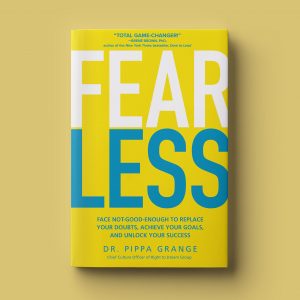Dr. Pippa Grange is a highly sought-after sports psychologist and culture coach based in the U.K. She is a deep thinker about performance, and she’s fearless when it comes to using two words that we don’t often hear joined with performance: love and soulfulness.

Her best-selling book Fear Less—in which she talks brilliantly about perfectionism, fear, anxiety, and the pitfalls of operating with clenched fists rather than open hearts—is a must-read and is now available in the U.S.
Dr. Grange and I had crossed paths spiritually for years, but we didn’t officially meet until earlier this year, when we recorded an episode of the Dare to Lead podcast. Not surprisingly, talking to her felt like a conversation with an old friend.
Here are three things I took away from that conversation and from reading Fear Less.
- Instead of performing at the thing in front of us—our job, our life, our role as a parent—we humans have become performative. That was a hard swallow for me. Thinking about how in our ever-commoditized, ever-on lives, each and every moment of our days has been turned into an opportunity to “perform.” So much so that we don’t even know anymore how to show up with our masks off, as our authentic selves.As Dr. Grange said in the podcast, “You pay too much mental rent to be a performer at all times. Whether you’re at the school gates picking up your kid, worrying about what the other parents might think if you’re 10 minutes late, or whether you’re walking out onstage to give a huge presentation or you’re about to swim a 100-meter race in an Olympics, it’s the same stuff. It’s the same, How am I showing up as a performer? And I just think it robs us of the richness of life. I think it’s a thief.”
- Win deep, not shallow. Grange describes “winning shallow” as a win that comes when we’re “winning to avoid not being good enough, winning to beat the other guy, winning to be seen as good enough.” It’s winning born of comparison and scarcity and self-doubt—and it’s not tied to our worth. “Winning deep,” on the other hand, is “where you actually can feel the richness of your journey, you are attached to the joy and the struggle, you are attached to the mess, and it is generally done for reasons outside of yourself and the fulfillment of our egoic needs. It is done more from a soul level—it’s done because we can and because there’s a wild desire in it.”I trip that wire when I have to be the knower, not the learner. For example, the joy for me in being a social scientist and a researcher comes from staying curious and learning. And so the moment I buy into this external belief that I have to have the answers—the moment I let myself slip into the knower—all the joy of my job evaporates, all the love goes away, and the work becomes grueling and I resent what I love. But when I’m grounded in being a learner, the grind turns into flow and I’m swept away.
- “If you can’t surrender, you can’t allow mystery, and if you can’t allow any mystery, you can’t open the door to soul.” One of the recurring points in Dr. Grange’s work is that results are just an outcome—but one you can’t really control. Sure, there’s loads you can do on the way up, as Dr. Grange says, but then you have to let go. And that’s hard to do, especially when you’ve tied your self-worth to outcome.
I’ll leave you with this final thought from Fear Less, which has really stuck with me: “It is scary to talk about soul or love in our hyper-rational, data-driven world, but I am convinced these are the missing pieces in our potential. And in fighting fear, this is the only genuine way to talk about change and becoming fearless.”
